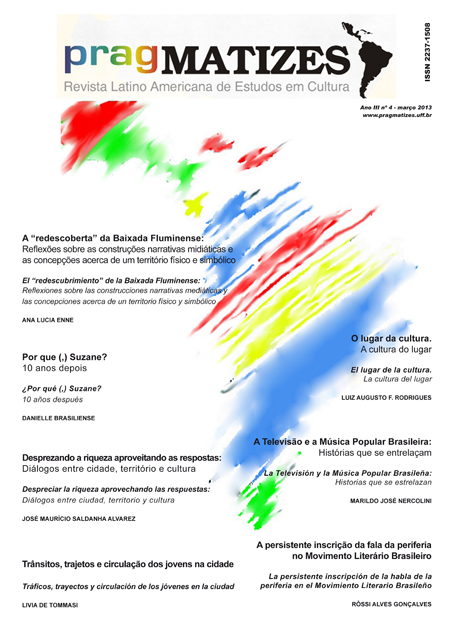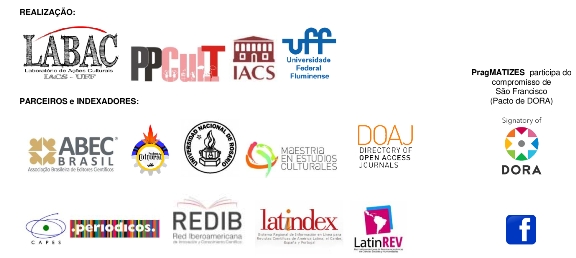The “rediscovery” of the Baixada Fluminense: Reflections about the narrative constructions of the media and the conceptions of a physical and symbolic territory
DOI:
https://doi.org/10.22409/pragmatizes.v1i4.10356Abstract
The aim of this article is to reflect on the relationship between the conceptions of an urban territory – in this case, the Baixada Fluminense – and the discursive constructions produced in the Carioca and Brazilian press throughout the 1990s. By analyzing journalistic articles that have as an object the Baixada Fluminense, it is possible to notice a shift of meanings about it, by which the newspapers act as legitimizing agents of both memory/past and project/future of the region. In this sense, we understand that the conformation of identities is heavily crossed by the cultural dimension, so that there is a shuffle between the physical and material conditions of a space and its symbolic appropriations, generating a constant dispute around the imagery of this space as a signified place.Downloads
References
ARANTES, Otília. Urbanismo em fim de linha. São Paulo: EDUSP, 2001.
BAKHTIN, Mikhail. Marxismo e Filosofia da Linguagem. São Paulo: Hucitec, 1979.
BOURDIEU, Pierre. “A identidade e a representação. Elementos para uma reflexão crítica sobre a idéia de região”. In: O Poder Simbólico. Lisboa: Difel, 1989.
BRIGGS, Asa. “The Sense of Place”. In: The Collected Essays of Asa Briggs. Great Britain: The Harverster Press, 1985.
CERTEAU, Michel. A Invenção do Cotidiano. Petrópolis, RJ: Vozes, 1998.
DUARTE, Eduardo. “Desejo de cidade – múltiplos tempos, das múltiplas cidades, de uma mesma cidade”. IN: PRYSTHON, Angela (org.). Imagens da cidade. Espaços urbanos na comunicação e cultura contemporâneas. Porto Alegre: Sulina, 2006.
ENNE, Ana Lucia. “Fluxos e interações da rede de memória e história na Baixada Fluminense”. Revista Pilares da História, Duque de Caxias, v. Ano II, n. nº 2, p. 37-52, 2003.
ENNE, Ana Lucia. “Imprensa e Baixada Fluminense: múltiplas representações”. Revista Ciberlegenda, n.14, 2004a.
ENNE, Ana Lucia. “Lugar, meu amigo, é minha Baixada”: memória, representações sociais e identidades. Tese de Doutorado em Antropologia Social, PPGAS/MN/UFRJ, 2002.
ENNE, Ana Lucia. “Memória, identidade e imprensa em uma perspectiva relacional”. Revista Fronteiras, Unisinos, v. VI, n. 2, p. 101-116, 2004b.
ENNE, Ana Lucia. “Memória e Identidade Social”. Revista Contracampo, Niterói, v. 6, 2002.
ENNE, Ana Lucia. Umbanda e Assistencialismo: um estudo sobre Representação e Identidade em uma Instituição da Baixada Fluminense. Dissertação de Mestrado em Antropologia Social, PPGAS/MN/UFRJ, 1995.
GOMES, Paulo C., CASTRO, Iná e CORRÊA, Roberto (orgs.). Geografia: conceitos e temas. Rio de Janeiro: Bertrand Brasil, 1995
FOUCAULT, Michel. “Sobre a Geografia”. In: __________. Microfísica do Poder. Rio de Janeiro: edições Graal, 1986.
HALL, Stuart. Da Diáspora. Belo Horizonte: ED. UFMG, 2003.
HEREDIA, Beatriz Maria Alasia de. “Região regiões: visões e classificações do espaço social”. In: ESTERCI, Neide, FRY, Peter e GOLDENBERG, Mirian (org.). Fazendo Antropologia no Brasil. Rio de Janeiro: DP&A Editora, 2001.
ORLANDI, Eni. Análise de Discurso. Campinas, SP: Pontes, 1999.
POLLACK, Michael. “Memória e identidade social”. In: Estudos Históricos, 5 (10). Rio de Janeiro, 1992.
RONCAYOLO, Marcel. “Região”. In: Região. Enciclopédia Einaudi, vol. 8. Lisboa: Imprensa Nacional – Casa da Moeda, 1986.
SOUZA, Marcelo José Lopes de. “O território: sobre espaço e poder, autonomia e desenvolvimento”. In: CASTRO, Iná, GOMES, Paulo C. e CORRÊA, Roberto (orgs.). Geografia: conceitos e temas. Rio de Janeiro: Bertrand Brasil, 1995.
VERÓN, Eliseo. A produção do sentido. São Paulo: Cultrix/USP, 1980.
WEBER, Max. “Las Comunidades Politicas”. In: Economia y Sociedad. México: Fondo de Cultura Económica, 1944.
Downloads
Published
How to Cite
Issue
Section
License
By forwarding an original to PragMATIZES, the authors agree that the copyright related to it is transferred to the Publishing. Articles and other writings are made available in PDF format from their publication, and they can be downloaded to institutional repositories and personal pages, provided that with their proper bibliographic indication.



